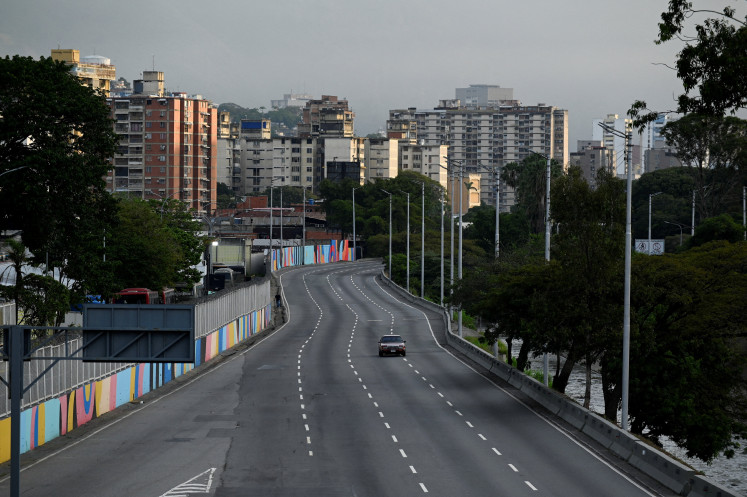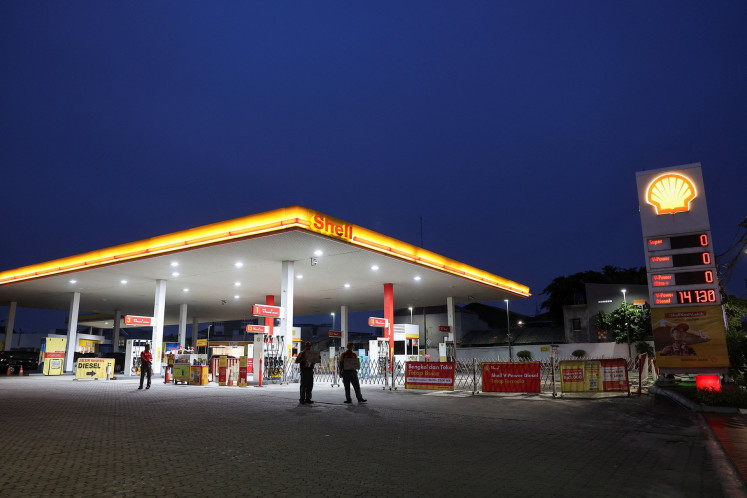Popular Reads
Top Results
Can't find what you're looking for?
View all search resultsPopular Reads
Top Results
Can't find what you're looking for?
View all search resultsPoso struggles for religious peace
Residents of Poso, Central Sulawesi, cannot take peace for granted, even though a 2001 peace pact ended clashes in the regency
Change text size
Gift Premium Articles
to Anyone
R
esidents of Poso, Central Sulawesi, cannot take peace for granted, even though a 2001 peace pact ended clashes in the regency. The Jakarta Post’s Bagus BT Saragih and Ruslan Sangadji file the second of a series of reports on sectarian conflict in Poso.
It was a beautiful sunny day at Imbo Beach in Tegal Rejo district, Poso, Central Sulawesi, when several locals and journalists arrived to bathe in its crystal clear waters last week.
One of them, Rafiq Syamsuddin came up with a puzzling question: “Do you know why this beach is named ‘Imbo’?”
“Imbo Beach was named after a man who was shot dead here. The slain man was her uncle,” Rafiq went on, pointing to Heidi, a Christian from Tentena, south of Poso city. “And the killer was him,” Rafiq said, referring to Andi Ipong, a former Muslim combatant who was also among the group enjoying the beach.
Imbo was the nickname of Tommy Sanjaya, a Christian public minivan driver who died in a drive-by shooting by several people on motorcycles, including Ipong, in 2004.
That afternoon, Heidi and Ipong got along, sometimes exchanged jokes, without any sign of awkwardness due to the history between them. “I was frequently teased by my friends [about the murder of my uncle] but I always told Ipong, ‘Don’t worry, I am not a vengeful kind of person’,” Heidi said.
The relationship between Heidi and Ipong reflects only a tiny picture of how Poso residents seem no longer troubled by the past sectarian conflict.
Herman, a Poso native who ran a shop near the Poso central market, agreed that locals no longer indulged in religious hatred. “Conflict only leads to negative effects. People were scared, the market was empty, and the economy became stagnant,” he said.
Poso was wracked by several sectarian conflicts that raged on and off between 1998 and 2001 and which claimed about 1,000 Muslim and Christian lives, and displaced 25,000 others.
Despite the Malino peace accord signed by Islamic and Christian leaders in December 2001, a string of attacks and clashes involving radical Muslims and security officers continued until 2008.
The conflict also resulted in disharmony between Muslims and Christians, which dominated the population of 220,000 in Poso regency. Religious issues became very sensitive in Poso; a tiny matter perceived as discriminatory or unfair to one community could ignite a much bigger reaction.
But Poso today is much more tolerant, thanks to the tireless efforts by peace advocates who are mostly former sectarian combatants from the troubled times of the past.
One of them is Rafiq, a former weapons and bomb maker who has since become an influential peace and anticorruption activist.
“We are working hard to recover from Poso’s horrible past, so we deplore any recent attempts to provoke hatred in Poso,” he said.
Rafiq was referring to a series of incidents in the past three months that have upset the three years of relative peace in Poso.
It started with the killing of Noldy Ambolado, a Christian from Sepe village in Lage district, on Aug. 26. About a week later, a homemade bomb exploded in the Christian-dominated Kawua village, in south Poso. On Oct. 24, a church in Madale, in Poso Pesisir district was set ablaze by unidentified people.
The most recent incident was the finding of another homemade bomb in the backyard of a house belonging to a Christian family in Tonipa hamlet, Poso Pesisir district, on Nov. 8.
The police’s Gegana bomb squad rushed to the scene following a report by Yulianti Oroh, one of the family members. The device was safely defused without injury.
Yulianti said she and her family did not feel terrorized by the incident. “We, as Christians, have a good relationship with our Muslim brothers,” she told The Jakarta Post.
The police have so far failed to fully uncover the perpetrators or the motives behind this series of incidents, prompting locals to speculate about a hidden agenda to incite the old sectarian rivalries.
“Other forms of provocation also occurred recently. For example, VCDs containing a story about an Islamic cleric being converted to Christianity were distributed. It was also followed by the distribution of VCDs about a Christian being converted to Islam. But most of us just stayed calm and managed to ease the tension,” Rafiq said.
A report by the International Crisis Group (ICG) in January 2008, presented similar findings concerning locals’ suspicions over the series of terror acts in Poso. “Many NGOs also remain convinced, despite all evidence to the contrary, that police deliberately allowed the violence to continue so they could get access to more counterterrorism funding. The lack of transparencyand oversight fuels this kind of thinking,” the report said.
The ICG also found that corruption in the management of the deradicalization program had slowed the program’s effectiveness.
“If corruption can be brought under control, if the vocational training programs bear fruit and if the government can find ways to start addressing the accountability issues, perhaps the residents of Poso will have reason to hope,” the report concluded.
Rev. Rinaldy Damanik, a respected Christian leader, shared Rafiq’s opinion.
“Poso has enjoyed relatively peaceful conditions for more than three years after the last bloody incidents. But today, we must revive our alertness and remain vigilant. The situation can worsen due to some invisible hands orchestrating the tension for a certain agenda,” he told the Post.
Central Sulawesi Police chief Brig. Gen. Dewa Parsana, meanwhile, proposed the so-called Village Security Assistance (Bankamdes) Forum to help prevent sectarian tensions being reignited.
“This forum is established at the village level and contains representatives of local residents from mixed backgrounds. Such a composition will help build trust among residents and help tackle hatred and radical infiltration,” he said.










